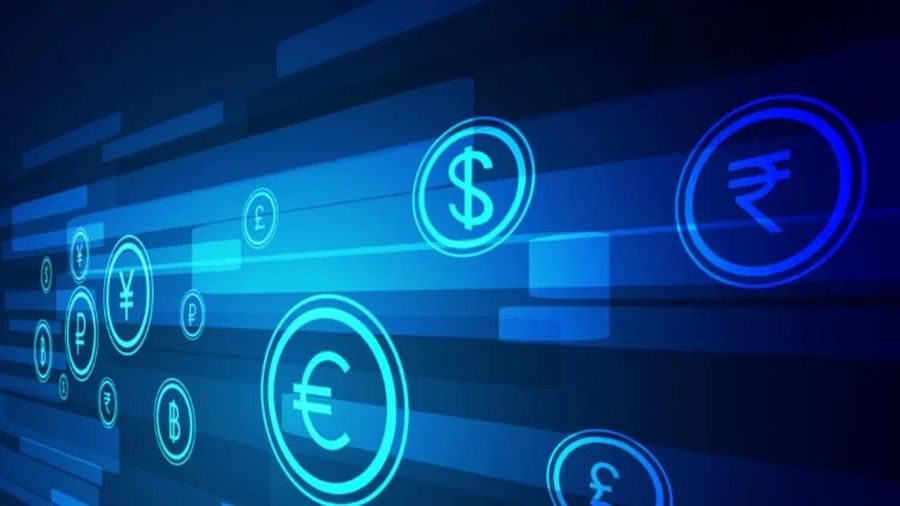Is Your Money Spying on You?
Slowly but steadily, our money is taking on a new role; in addition to its traditional function as a medium of exchange and store of value, money is increasingly becoming a means of surveillance and control.
Financial privacy has become one of the biggest casualties in the world’s relentless march to a digital payments system. Not only do corporations like your bank, credit card issuer, PayPal, and Amazon know your buying habits intimately, this data is routinely passed on to government to be mined in a warrantless search for criminal activity.
Behind this phenomenon is what some call the “war on cash,” with the goal of a cashless society. This transition includes partnerships of banking and tech companies, and the rise of the “fintech” industry.
A report by McKinsey, a management consultancy, states that 89 percent of Americans are now using some form of digital payments and more than two-thirds of Americans use or expect to use digital wallets in the next two years. The service providers for these digital wallets include banks, PayPal, Apple Pay, and Google Pay.
An August 2022 Gallup poll found that 60 percent of Americans now say they make “only a few” or no purchases with cash today, nearly double the 32 percent who said so five years ago. And the phasing out of cash also brings the decline of the most private medium of exchange available today.
“You have, on the one hand, a desire to be more efficient on the consumers’ part, on the part of businesses, and on the part of banks,” E.J. Antoni, an economist at the Heritage Foundation, told The Epoch Times. “On the other hand, you do have people who want a cashless society because it eases the transition to a central bank digital currency, and the problem is that both of these groups want the exact same thing.”
Banks, credit card issuers, payment companies, and tech companies profit from the fee income that comes with digital payments. And for banks, there is the cost savings from not having to handle physical cash or interact with customers in person, as well as the fact that digital transactions ultimately require having accounts with a bank or other fintech company. In short, it is a system outside of which few can survive today.
Consumers have embraced this transition because of the convenience, and are either unaware of, or unconcerned about, the loss of personal privacy it brings. Law enforcement also supports the transition because digital transactions leave fingerprints that can be tracked and data-mined.
Advancing Financial Surveillance
Under the digital financial system, the means of surveillance and control are extensive. A series of laws, starting with the 1970 Bank Secrecy Act (BSA), and including the 2001 PATRIOT Act, and most recently the 2021 Infrastructure Act, banks, broker dealers, casinos, mortgage companies, mutual funds, money service companies and other financial institutions must report to the federal Financial Crimes Enforcement Network (FinCEN) all transactions over $10,000 (pdf) and any other transactions they consider “suspicious.”
One thing these laws have in common is that, while widening the net of information the government is allowed to collect on private citizens, they also stipulate that neither the financial institutions nor government officials should inform customers that their accounts are being searched.
“Instead of protecting the privacy of their depositors, financial institutions are forced to protect the secrecy of government investigations,” Nicholas Anthony states in a Cato Institute report, “whether those investigations have a legitimate criminal predicate or not.”
In 2019 alone, FinCen reported that more than 20 million suspicious activity reports (SARs) were filed by more than 97,000 U.S. financial institutions, “providing a wealth of potentially useful information to agencies whose mission is to detect and prevent money laundering, other financial crimes, and terrorism.”
While the $10,000 threshold set in 1970 under the BSA would be more than $72,000 today, taking inflation into account, this threshold was not indexed for inflation, meaning that an ever-widening number of Americans are now being tracked under a law that was originally intended to capture large-scale criminal transactions. In 2021, the Biden administration attempted to enact an even lower threshold for reporting transactions of $600, though this effort was ultimately put on hold.
In February 2022, the New York Post reported that Bank of America had data-mined its customer accounts after the Jan. 6 riots to determine who among their customers may have traveled to Washington D.C., made purchases or used ATMs there, or bought firearms around that time. The account information of more than 200 customers, collected without a warrant, was reportedly handed over to the FBI.
Expanding the surveillance network beyond banks, credit card companies Visa, MasterCard, and American Express agreed in September 2022 to begin tracking firearms purchases, with the goal of handing over the law enforcement any purchases they deemed “suspicious.” Following a public outcry, the card companies have put this effort on hold at present.
All of these actions create enormous pools of data for government officials to collect and sort through, despite the fact that this sort of warrantless surveillance violates the Constitution’s Fourth Amendment, which prohibits government searches without “probable cause” that citizens being searched have committed a crime.
Despite Constitutional protections, the Supreme Court has rejected challenges to the BSA, ruling that the government can conduct warrantless searches under what is called the “third party” doctrine, or the notion that when a person shares their personal data with a third party such as a bank, the right to privacy no longer applies. There is reason to believe, however, that the Supreme Court as currently composed may take a different view.
In his Cato report, Anthony states that the use of bank accounts and digital payment services is so essential to everyday living today that it becomes exceedingly difficult for most Americans to transact, or even survive, outside the system. For this reason, both liberal and conservative Supreme Court justices appear willing to reconsider the “third party” doctrine, and roll back the ability of government officials to conduct warrantless searches, if a relevant case were to come before them.
“It may be necessary to reconsider the premise that an individual has no reasonable expectation of privacy in information disclosed to third parties,” Justice Sonia Sotomayor wrote in the 2012 case United States v. Jones. “This approach is ill suited to the digital age, in which people reveal a great deal of information about themselves to third parties in the course of carrying out mundane tasks.”
The Cashless Society Vanguard
As the world progresses toward a cashless society, one of the countries in the vanguard is Sweden.
Using fintech apps like Swish, BankID, and Klarna, the percentage of Swedes still paying in cash fell from 39 percent in 2010 to 9 percent in 2020. A microchip implanted in a person’s hand that can simply be waived over a sensor in stores to make payments has become popular, with thousands of Swedes opting to have it implanted. Sweden is also piloting a CBDC called the E-krona.
A British-Polish firm called Walletmor has also developed an implanted payment chip, which lights up under your skin when making a payment.
Walletmor founder and CEO Wojtek Paprota says the chip is “entirely safe, has regulatory approval, works immediately after being implanted, and will stay firmly in place. It also does not require a battery, or other power source.”
The cashless society is advancing in the United States as well. A Pew Research survey in October 2022 found that “in less than a decade, the share of Americans who go cashless in a typical week has increased by double digits.” Today, the survey found, 41 percent of Americans say none of their purchases in a typical week are paid for using cash, up from 24 percent in 2015.
But the decline in cash payments is uneven across demographic groups. For example, among Americans who earn more than $100,000 per year, only 5 percent make a significant number of purchases in cash. Among those earning less than $40,000 per year, about 20 percent use cash frequently or exclusively.
In addition, a cashless society is something Americans say they do not want. A survey by Civic Science found that 62 percent of Americans say they are against the idea of a cashless society. While the elderly are typically more attached to cash payments and younger generations are more likely to embrace fintech, the survey also found that “younger adults are also the most likely to use cash and the least likely to directly use debit or credit cards for purchases. Gen Z in particular is embracing alternatives to plastic, including writing checks.”
The Endgame: Central Bank Digital Currencies
One thing that few outside of government seem to want is a central bank digital currency (CBDC). For many governments including the Biden administration, however, introducing a CBDC, which is a programmable, traceable digital form of money issued directly by government agencies and held in digital “wallets,” is a top priority.
According to the Atlantic Council’s CBDC Tracker, as of March 1, 65 countries are in the advanced stage of developing a CBDC, more than 20 countries have launched pilots, and in total 119 countries are in some stage of developing CBDCs, representing more than 95 percent of the world’s GDP. The Biden administration has also thrown its weight behind the development of a U.S. CBDC, and the Fed has beta-tested versions of it, both for domestic payments and international settlements.
“The usual model of [CBDCs] is everybody can have a bank account on the books of the Federal Reserve System, and that certainly is a pathway to surveillance,” Lawrence White, economics professor at George Mason University, told The Epoch Times. “Your bank account is not as private as you might think now, but at least the federal authorities don’t have real time access to every check you wrote and don’t know where you spent it and where you received your money from; with a central bank, digital currency they could.
“That, of course, is the purpose of the system that’s being implemented in China,” White said. “It’s being implemented precisely in order to surveil people and to restrict their spending on things that are not approved. So that’s certainly not a model we want to emulate in the United States, and there is the danger, not that anybody at the Fed wants to be in the surveillance business, but that they will be pressured by other federal agencies that do want information about their customers, and the Fed is not in a position to resist them.”
“We don’t know who is using a $100 bill today, we don’t know who’s using a 1,000-peso bill today,” Agustin Carstens, general manager of the Bank of International Settlements, stated in October 2020. “The key difference with a CBDC is the central bank will have absolute control of the rules and regulations that will determine the use of that central bank liability, and also we will have the technology to enforce that.”
“One of the things you can do with a central bank digital currency is, instead of trying to manipulate people through the tax code, you can directly affect their purchases by simply saying only X percent of your income can be spent on anything fossil fuel related, whether that’s a gasoline powered car, a fossil fuel powered appliance, whatever the case may be,” Antoni said. “Maybe a certain percentage of your electricity comes from fossil fuels, in which case you’re only allowed to use a certain number of kilowatt hours per month.”
Republicans in Congress and several conservative U.S. states have taken steps to block the Biden administration from establishing a CBDC. In March, Sen. Ted Cruz (R-Texas) introduced a bill to ban the federal government from adopting a CBDC. Also in March, Florida and Texas took action to ban the introduction of a CBDC in America.
“I think that resistance in the U.S. is important because I don’t think in other countries there will be enough resistance to it,” Dror Goldberg, economics professor at Open University of Israel, told The Epoch Times. “I think in the U.S., you might be able to put up a good fight and prevent it. In other countries, I don’t see that happening.”
Freezing Dissidents’ Accounts
One of the most striking incidents of financial control, even without a CBDC, occurred in Canada in February 2022, when the Canadian government ordered banks to freeze the accounts and credit cards of truckers who were protesting pandemic restrictions.
“We are today serving notice if your truck is being used in these illegal blockades, your corporate accounts will be frozen,” Deputy Prime Minister Chrystia Freeland stated. “The insurance on your vehicle will be suspended,” she said, adding that personal accounts would also be included in the order.
Canadian officials threatened donors who had given to apps like GoFundMe and GiveSendGo in support of the truckers with similar punishment. Many Americans believed that this could not occur in the United States, but some analysts are less confident.
Given the “demonstrable willingness of Congress to expand the weaponization of the financial infrastructure,” Anthony states, “it’s reasonable to think the United States will do the same if presented with a similar emergency situation.”
“It’s something that [George] Orwell probably could not have even dreamed of because the technology just wasn’t available,” Antoni said. “But as technology continues to progress, we are seeing a continued march, unfortunately, towards serfdom, to borrow a phrase from [F.A.] Hayek.”
If the U.S. government needed to enforce a given policy, it wouldn’t necessarily have to arrest people for non-compliance, Antoni said. “What they would do instead is simply make it so that when you go to buy groceries, your credit card is declined.”
“Your money is absolutely turning into a means of control and not just a medium of exchange.”







